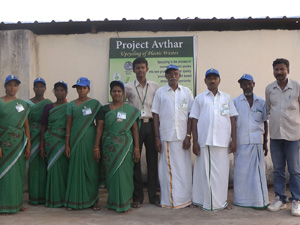
Imagine a day when the person collecting your garbage doesn’t come to your house. Imagine this not happening for a few days, weeks, even months. What happens if the garbage bins in your area remain untouched? If this should ever happen it will spell doom for any area and bring on an onslaught of pollution and disease.
Yet, how many of us think about that the ubiquitous waste picker who not only collects the garbage, but often sifts through heaps of rubbish on the streets and at dumping grounds to recover recyclables in order to earn a living? In the process, this waste picker also ensures that harmful elements like plastic, glass, medical waste do not reach the dumping ground and pollute the air and ground water.
According to Chintan Environmental Research and Action Group, a Delhi-based organization that works on improving the disposal of waste, most Indian cities are run on the work of the informal sector, which includes waste pickers who form 1% of an average city's population and do the important job of recycling waste and reducing pressure on the environment. Their work helps clean up our cities by recycling approximately 20% of the waste generated. And yet, they lack formal recognition, equal rights, secure and safe livelihoods and dignity. And as consumption patterns change with a growing economy, their work exposes them to ever higher levels of pollution and dangerous toxins.
Besides Chintan, several organizations across the country have been working not just to empower the waste picker, but also to make civil society realize the crying need for the same. In Pune, the 3,000 or so waste pickers who form the SWaCH cooperative are unequivocal about the positive impact it has had on their lives. As a union, they have fought for clean and dignified working conditions and have been awarded with recognition by citizens of their work as a service. They have also been able to regularize their work hours, make sure that they get fixed salaries and are able to work with pushcarts, gloves, masks and footwear. SWaCH’s has supported them with learning the skills to negotiate in their line of work, getting loans, accessing healthcare and providing their children with education. All of this has brought a sea change in their lives.
Yet, the positive changes, from dignity and job security to self-confidence and higher aspirations for oneself and one’s family, are like ripples in a pond. SWaCH member Mangal Gaikwad says: “Today, I earn Rs 3,000 from doorstep collection and the sale of scrap. The residents in the area who used to frown at me while I was at the garbage bin, now know my name and greet me. A resident gave me a second hand bicycle. I had never ridden one before. Today, I ride to work on that cycle. Since my work day is shorter now I am able to attend the literacy class in my slum. I am now literate. I am the Treasurer of a credit co-operative and a proud representative of my slum. Earlier, I used to be terrified of my abusive alcoholic husband, but I am no longer terrified of him. I refuse to give him money to drink, and have bought a bigger house with my savings and a loan I took from the credit co-operative.”
Similarly, Stree Mukti Sanghatana in Mumbai has been working to organize women and train them in environmental entrepreneurship, which includes organic manure making, gardening, leadership development, the formation of cooperatives, etc. It has also helped them acquire literacy, educate their children, form saving groups, and access microcredit and healthcare.
In Bangalore, the organization Hasirudala works towards integrating wastepickers and other informal sector waste workers into the changing solid waste management landscape of the city. A high court order in 2012 instructed every ward in the city to segregate waste at source, set up dry waste collection centres and compost of wet waste locally.
“Earlier the police would pick us up and often insult us because of the work we did. Now we have uniforms and badges given by the civic body so no one bothers us unnecessarily. We even got some person to make a down payment for a vehicle for us and we now collect dry waste in it and send it for recycling,” explains Krishna who is associated with Hasirudala and works at one such dry waste collection centre.
Waste pickers aim to keep as much waste out of the landfills and waste dumps as possible and to help make waste useful and profitable. It is time to treat them with respect and empower them with basic rights.